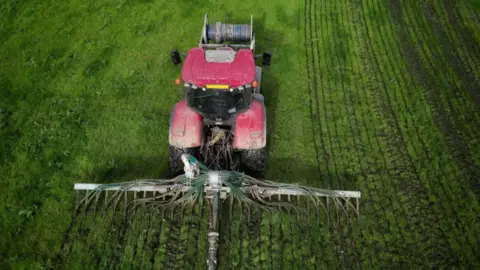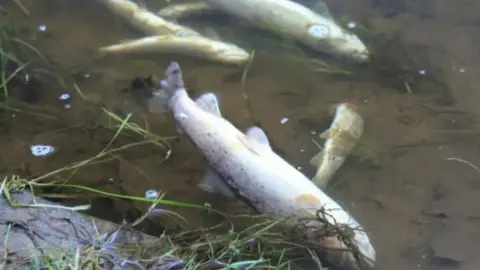Muck-spreading regulations needed, review finds
 BBC
BBCAn independent review has backed controversial muck-spreading regulations for farms across Wales, but said improvements are needed.
Stricter rules on spreading and storing manures have been phased in since 2021, against a backdrop of fierce opposition from the farming industry.
A study found "significant opportunities" to better target the rules and make them clearer, but concluded they were ultimately necessary to tackle agricultural pollution.
The Welsh government said it would implement all recommendations in full, though some would take longer to deliver.
The recent Control of Agricultural Pollution regulations have been the subject of debate in Wales for the best part of a decade.
They were one of a number of factors cited by famers during widespread protests against the Welsh government throughout February 2024.
River and wildlife groups have consistently called for tougher action, as studies show run-off from farms to be a major contributor to water quality issues across the country.
The scale of the problem was once branded "embarrassing", by the former rural affairs minister Lesley Griffiths.
Farms must have five months' worth of slurry storage capacity and most are no longer allowed to spread their animals' manure for three months from mid October each year.
How much manure can be spread per hectare is limited too.
Unions claim the regulations threaten the viability of some farming businesses, which either have to invest heavily to improve slurry storage or reduce their livestock numbers.
The Welsh government committed to look at how the regulations were working every four years, and appointed Dr Susannah Bolton, a Vice Principal of Scotland's Rural College to chair the first review.
 PA
PAHer report found that while the current regulatory approach was sound, improvements could be made to benefit both farmers and the environment.
She decided the all-Wales approach was right, but that the regulations could be better targeted so that farms carrying out activities that had a lower risk of causing pollution faced fewer restrictions.
She urged the government to explore "alternative measures" to some of the most controversial aspects too - including the outright ban on slurry spreading over winter months - known as a closed period.
While allowing farmers to spread according to the conditions and needs of their crop added more complexity in terms of reporting, she concluded this was an approach worth taking.
For farmers, it raises the prospect of a change to one of the aspects of the policy they most disagree with.
They have long argued that having rigid calendar dates for when slurry spreading is allowed would cause problems.
Dr Bolton concluded there was a need to improve accessibility and clarity of the regulations for farmers, while gaps in the rules - including around soil protection measures and nutrient management planning needed to be addressed, too.
 Afonydd Cymru
Afonydd CymruShe said the work had "demonstrated that there are strongly shared aspirations for improving water quality in Wales".
"I am genuinely optimistic that the recommended changes... will enable a greater degree of common agency and shared responsibility to address the challenges," she added.
Deputy First Minister, with responsibility for climate change and rural affairs, Huw Irranca-Davies, said "water quality in Wales is still being detrimentally impacted and improvements must continue to be made".
"Whilst the causes of pollution are not limited to any one sector, agriculture remains one of the main contributors," he added.
"The review agrees with our overall approach to the regulations but also shows ways we can make things better for both farmers and our environment. I plan to put all these recommendations into action."
The Welsh government noted that some changes, around making the regulations more accessible and clearer, "will be implemented quickly".
However "more complex recommendations requiring scientific and agronomic expertise will take longer to develop", it said.
'Devil will be in the detail'
Farmers Union of Wales (FUW) president Ian Rickman said the union had consistently opposed the regulations "due to their bureaucratic, costly and disproportionate nature."
However "a commitment from the Welsh government to explore alternative innovative solutions to the closed periods and nitrogen limits has to be welcomed, as does the hint towards a risk-based approach through lessening the burden for low-risk farmers and potential exemptions," he said.
"We now expect the Welsh government to publish a programme of works over the coming months outlining how these recommendations will be taken forward.
"Whilst the devil will be in the detail, working in collaboration with the farming industry is paramount so that long-term confidence can be provided to the sector."
But NFU Cymru president Aled Jones said its members would be frustrated by the government's response to the review.
"Farmers will be extremely annoyed that nothing has materially changed as a result of today's announcement – the existing regulations remain in place - and farmers, already under very significant pressure, now face the very real threat of additional regulation in the future," he said.
WWF Cymru pointed to recent research showing that seven out of nine of Wales' most protected rivers for wildlife were failing pollution targets.
"There is a crucial need for robust regulations to effectively tackle water pollution from agriculture," said Cath Lehane, the charity's agriculture and freshwater senior policy advisor.
"This latest review now underscores the urgent need for Welsh government to prioritise implementing measures which reduce incidents of agricultural pollution, as well as delivering a Sustainable Farming Scheme that incentivises actions to reduce pollution to help improve the health of all our Welsh waters."
